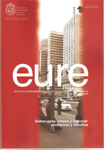Urban sprawl and new challenges for (metropolitan) governance in Latin America: the case of Santiago de Chile
DOI:
https://doi.org/10.4067/S0250-71612009000100002Keywords:
urban sprawl, local governmentAbstract
Massive expansion of urban areas is not a new experience to Latin American cities. However, the profound social, ecological and economic implications of urban sprawl are only today starting to become a major concern in the continentÍ€™s big agglomerations. By taking Santiago de Chile as an example this paper discusses the challenges posed to urban governance by urban sprawl. It fi rst summarizes recent trends in residential housing production where large scale residential Í€˜megaprojectsÍ€™ have become highly signifi cant. Second, by looking at these trends from the perspective of the international sprawl literature it fi nds that urban sprawl in Santiago is largely driven by policy and decision making. It thirdly constructs a basic analysis of sprawl governance in terms of actors, institutions and their interplay on the basis of the few existing studies and the authorÍ€™s own ongoing research. Finally, the paper suggests some entry points and broad strategies to address sprawl.
ÍDownloads
Published
How to Cite
Issue
Section
License
Copyright (c) 2009 Revista EURE - Revista de Estudios Urbano Regionales

This work is licensed under a Creative Commons Attribution 4.0 International License.
Al momento de aceptar la publicación de sus artículos, los autores deberán formalizar la cesión de derechos de autor a EURE, según las condiciones establecidas por la Revista.
Ésta establece que el autor autoriza a EURE de manera gratuita, exclusiva e ilimitada a reproducir, editar, publicar, distribuir, publicitar, comercializar y traducir el artículo, a cualquier soporte conocido o por conocer y desarrollar.
Del mismo modo, los autores aseguran que el artículo propuesto es original, no publicado y no propuesto para tal fin a otro medio de difusión.


